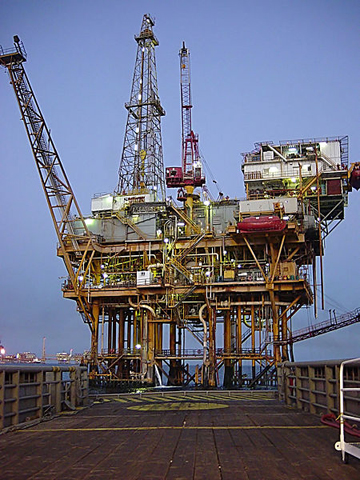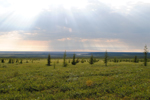The world could be heading for a major economic crisis as stock markets inflate an investment bubble in fossil fuels to the tune of trillions of dollars, according to leading economists.
“The financial crisis has shown what happens when risks accumulate unnoticed,” said Lord (Nicholas) Stern, a professor at the London School of Economics. He said the risk was “very big indeed” and that almost all investors and regulators were failing to address it.
The so-called “carbon bubble” is the result of an over-valuation of oil, coal and gas reserves held by fossil fuel companies. According to a report published on Friday, at least two-thirds of these reserves will have to remain underground if the world is to meet existing internationally agreed targets to avoid the threshold for “dangerous” climate change. If the agreements hold, these reserves will be in effect unburnable and so worthless—leading to massive market losses. But the stock markets are betting on countries’ inaction on climate change.
The stark report is by Stern and the thinktank Carbon Tracker. Their warning is supported by organizations including HSBC, Citi, Standard and Poor’s and the International Energy Agency. The Bank of England has also recognized that a collapse in the value of oil, gas and coal assets as nations tackle global warming is a potential systemic risk to the economy, with London being particularly at risk owing to its huge listings of coal.
Stern said that far from reducing efforts to develop fossil fuels, the top 200 companies spent $674bn (£441bn) in 2012 to find and exploit even more new resources, a sum equivalent to 1% of global GDP, which could end up as “stranded” or valueless assets. Stern’s landmark 2006 report on the economic impact of climate change—commissioned by the then chancellor, Gordon Brown—concluded that spending 1% of GDP would pay for a transition to a clean and sustainable economy.
 Offshore oil platform in the Gulf of Mexico. Photo by: Chad Teer. |
The world’s governments have agreed to restrict the global temperature rise to 2C, beyond which the impacts become severe and unpredictable. But Stern said the investors clearly did not believe action to curb climate change was going to be taken. “They can’t believe that and also believe that the markets are sensibly valued now.”
“They only believe environmental regulation when they see it,” said James Leaton, from Carbon Tracker and a former PwC consultant. He said short-termism in financial markets was the other major reason for the carbon bubble. “Analysts say you should ride the train until just before it goes off the cliff. Each thinks they are smart enough to get off in time, but not everyone can get out of the door at the same time. That is why you get bubbles and crashes.”
Paul Spedding, an oil and gas analyst at HSBC, said: “The scale of ‘listed’ unburnable carbon revealed in this report is astonishing. This report makes it clear that ‘business as usual’ is not a viable option for the fossil fuel industry in the long term. [The market] is assuming it will get early warning, but my worry is that things often happen suddenly in the oil and gas sector.”
HSBC warned that 40-60% of the market capitalization of oil and gas companies was at risk from the carbon bubble, with the top 200 fossil fuel companies alone having a current value of $4tn, along with $1.5tn debt.
Lord McFall, who chaired the Commons Treasury select committee for a decade, said: “Despite its devastating scale, the banking crisis was at its heart an avoidable crisis: the threat of significant carbon writedown has the unmistakable characteristics of the same endemic problems.”
The report calculates that the world’s currently indicated fossil fuel reserves equate to 2,860bn tonnes of carbon dioxide, but that just 31% could be burned for an 80% chance of keeping below a 2C temperature rise. For a 50% chance of 2C or less, just 38% could be burned.
Carbon capture and storage technology, which buries emissions underground, can play a role in the future, but even an optimistic scenario which sees 3,800 commercial projects worldwide would allow only an extra 4% of fossil fuel reserves to be burned. There are currently no commercial projects up and running. The normally conservative International Energy Agency has also concluded that a major part of fossil fuel reserves is unburnable.
Citi bank warned investors in Australia’s vast coal industry that little could be done to avoid the future loss of value in the face of action on climate change. “If the unburnable carbon scenario does occur, it is difficult to see how the value of fossil fuel reserves can be maintained, so we see few options for risk mitigation.”
Ratings agencies have expressed concerns, with Standard and Poor’s concluding that the risk could lead to the downgrading of the credit ratings of oil companies within a few years.
Steven Oman, senior vice-president at Moody’s, said: “It behooves us as investors and as a society to know the true cost of something so that intelligent and constructive policy and investment decisions can be made. Too often the true costs are treated as unquantifiable or even ignored.”
Jens Peers, who manages €4bn (£3bn) for Mirova, part of €300bn asset managers Natixis, said: “It is shocking to see the report’s numbers, as they are worse than people realize. The risk is massive, but a lot of asset managers think they have a lot of time. I think they are wrong.” He said a key moment will come in 2015, the date when the world’s governments have pledged to strike a global deal to limit carbon emissions. But he said that fund managers need to move now. If they wait till 2015, “it will be too late for them to take action.”
Pension funds are also concerned. “Every pension fund manager needs to ask themselves have we incorporated climate change and carbon risk into our investment strategy? If the answer is no, they need to start to now,” said Howard Pearce, head of pension fund management at the Environment Agency, which holds £2bn in assets.
Stern and Leaton both point to China as evidence that carbon cuts are likely to be delivered. China’s leaders have said its coal use will peak in the next five years, said Leaton, but this has not been priced in. “I don’t know why the market does not believe China,” he said. “When it says it is going to do something, it usually does.” He said the US and Australia were banking on selling coal to China but that this “doesn’t add up”.
Jeremy Grantham, a billionaire fund manager who oversees $106bn of assets, said his company was on the verge of pulling out of all coal and unconventional fossil fuels, such as oil from tar sands. “The probability of them running into trouble is too high for me to take that risk as an investor.” He said: “If we mean to burn all the coal and any appreciable percentage of the tar sands, or other unconventional oil and gas then we’re cooked. [There are] terrible consequences that we will lay at the door of our grandchildren.”
Related articles
Despite unseasonable cold in EU and U.S., March was tenth warmest on record
(04/22/2013) While the month of March saw colder-than-average temperatures across a wide-swath of the northern hemisphere—including the U.S., southern Canada, Europe, and northern Asia—globally, it was the tenth warmest March on record in the last 134 years, putting it in the top 7 percent.
Last 30 years were the warmest in the last 1,400 years
(04/21/2013) From 1971 to 2000, the world’s land areas were the warmest they have been in at least 1,400 years, according to a new study in Nature Geoscience. The massive new study, involving 80 researchers from around the world with the Past Global Changes (PAGES) group, is the first to look at continental temperature changes over two thousand years, providing insights into regional climatic changes from the Roman Empire to the modern day. According to the data, Earth’s land masses were generally cooling until anthropogenic climate change reversed the long-term pattern in the late-19th Century.
At top of the world, activists say exploiting Arctic is ‘utter madness’
(04/17/2013) Four young explorers including American actor Ezra Miller have planted a flag on the seabed at the north pole and demanded the region is declared a global sanctuary. The expedition, organized by Greenpeace, saw the flag lowered in a time capsule that contained the signatures of nearly 3 million people who are calling for a ban on exploitation in the region.
Hate flying? climate change will make it even rougher

(04/10/2013) Climate change will lead to bumpier flights caused by increased mid-air turbulence, according to an analysis by scientists of the impact of global warming on weather systems over the next four decades. The increasing air turbulence results from the impact of climate change on the jet streams, the fast, mile-wide winds that whistle round the planet at the same altitude as airliners. The shifting of the jet stream over Europe has also been blamed for the UK’s wash-out summer in 2012 and frozen spring this year.
Norwegian Pinot Noir?: global warming to drastically shift wine regions
(04/08/2013) In less than 40 years, drinking wine could have a major toll on the environment and wildlife, according to a new study in the Proceedings of the National Academy of Sciences (PNAS). The study finds that climate change will likely force many vineyards to move either north or to higher altitudes, leading to habitat loss, biodiversity declines, and increased pressure for freshwater. Some famous wine-growing areas could be lost, including in the Mediterranean, while development of new wine areas—such as those in the Rocky Mountains and northern Europe—could lead to what the the scientists describe as “conservation conflicts.”
U.S. Republican voters want action on climate change
(04/03/2013) A new poll by the Center for Climate Change Communication (4C) at George Mason University finds that a majority of U.S. citizens who identify as Republicans or Republican-leaning independents want the government to do more to tackles climate change. Sixty-two percent of those polled said that the U.S. government “absolutely should” or “probably should” takes steps to address climate change. This goes against the views of many Republican congressmen—as well as the party platform—who largely oppose action on climate change.
By 2050 much of the Arctic could be green

(04/01/2013) Warming about twice as fast as the rest of the world, the Arctic is already undergoing massive upheavals from climate change: summer sea ice is thinning and vanishing, land based ice sheets are melting, and sea levels are rising. Now a new study in Nature Climate Change predicts that vegetation cover in the Arctic could expand by over 50 percent by 2050. Although increased vegetation would sequester additional carbon, this would be more-than-offset by the loss of the albedo effect, whereby sunlight bounces off white (snow and ice covered) parts of the Earth.
Scientists find the ‘missing heat’ of global warming 700 meters below the sea

(03/28/2013) Critics of climate change often claim that warming has stopped since the late 1990s. While this is categorically false (the last decade was the warmest on record and 2005 and 2010 are generally considered tied for the warmest year), scientists do admit that warming hasn’t occurred over land as rapidly as predicted in the last ten years, especially given continually rising greenhouse gas emissions. But a recent study in Geophysical Research Letters has found this so-called missing heat: 700 meters below the surface of the ocean.
Extreme cold linked to climate change, say scientists
(03/26/2013) Climate scientists have linked the massive snowstorms and bitter spring weather now being experienced across Britain and large parts of Europe and North America to the dramatic loss of Arctic sea ice.
U.S. Admiral: climate change, not North Korea, biggest threat in the Pacific
(03/13/2013) This week, Admiral Samuel J. Locklear II, the head of U.S. military forces in the Pacific, told The Boston Globe that climate change was the gravest threat in the region. While such an assessment may be surprising, given North Korea’s recent nuclear tests, the U.S. military has long viewed climate change as a massive destabilizing force on global security.
Rainforests may be more resilient to global warming – in isolation – than previously forecast
(03/11/2013) Tropical forests may be less sensitive to global warming than previously thought, argues a new study published in Nature Geoscience.
Human activity driving unprecedented temperature shift
(03/08/2013) Average global temperatures are now higher than any point during the past 4,000 years despite being in the midst of what should be a cooling interval, reports a new study published in the journal Science.
Increasing number of Americans believe climate change is real
(03/08/2013) An increasing number of Americans believe there is evidence for climate change, reveals a new poll conducted by researchers at the University of Michigan.
Near-record jump in carbon concentrations in global atmosphere last year
(03/06/2013) Carbon dioxide now makes up around 395 parts per million in the atmosphere, according to new data from the National Oceanic Atmospheric Administration (NOAA). Measuring atmospheric carbon in Mauna Loa, Hawaii, the NOAA notes that last year saw a jump of 2.67 parts per million, second only to a record jump in carbon concentrations in 1998—2.93 parts per million. The news further dampens hopes that nations will stick to their goal of keeping global temperatures from rising more than 2 degrees Celsius (3.6 degrees Fahrenheit) above pre-industrial levels.







